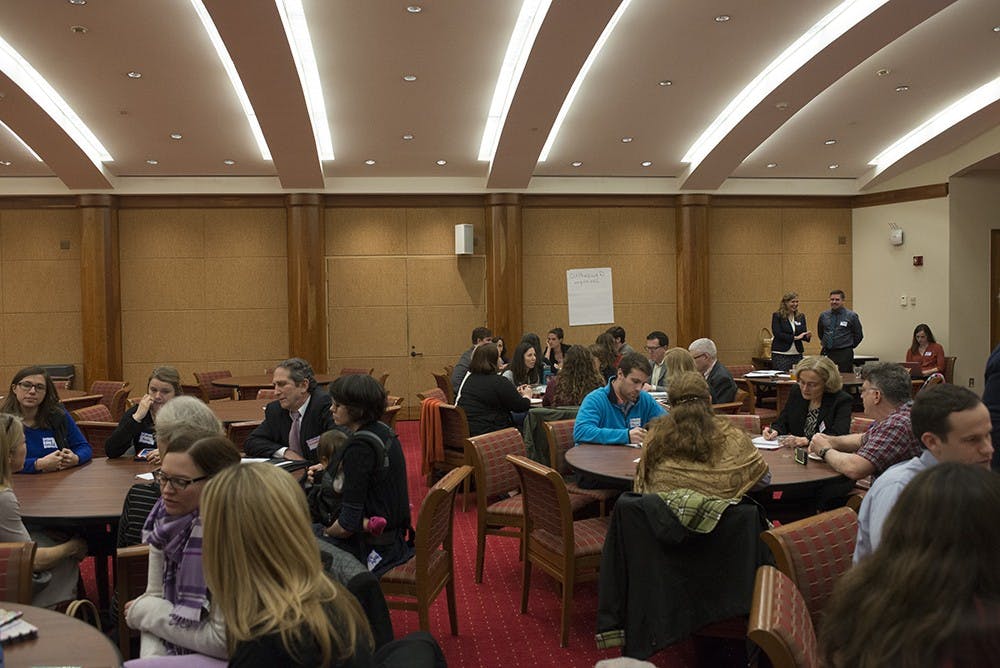The Culture Working Group of the President’s Ad Hoc Group met Wednesday to address cultural norms and issues surrounding sexual assault at the University.
The town hall style meeting was the final component of a three-day series intended to address safety on Grounds. The three working groups — prevention, response and culture — will present their final suggestions to the Ad Hoc Committee March 25. President Teresa Sullivan created the Ad Hoc Committee in December following the release of a Rolling Stone article detailing the alleged gang rape of a University student in 2012.
The purpose of the Culture Working Group is “to explore the topic of culture and to consider what steps the University might reasonably take to improve its culture,” said culture working group chair Sharon Hostler, a senior associate dean for the Medical School.
Charlottesville community member Susan Rives, the parent of a current University student, said a change in culture must primarily take victims into account.
“[The] biggest concern [is that] victims don’t believe that they will be believed,” Rives said. “They are in shock and want to [normalize the incident], and they believe that the culture here will not believe them so they will not speak about it.”
Attendees voiced concerns including the first year transition process, community inclusivity, gender and sexual identity objectification, bystander intervention and alcohol abuse.
First years’ transition into college life was continually stressed as an area of concern. The working group discussed ways to help first years feel integrated into the University community.
Second-year College student Brittany Brown said she is interested in first year students’ initial impression of Grounds.
“[The] culture seen by [first-year] students that minute they walk on Grounds... [and] the first impacts they have [are key],’’ she said. “I hope that at some point in the future we can have a large group of first years to tell us [good things] they saw when they came to Grounds this past August.”
Architecture Assoc. Prof. Sanda Iliescu said first-year students need to feel integrated with the University in a multitude of settings.
“The need for first-year students to feel integrated with…upperclassmen [extends] beyond just living and eating [arrangements to] extracurricular activities as well,” Iliescu said.
Iliescu went on to relate student frustration with the University administration’s inaccurate portrayal of a divide between students involved and not involved in Greek life.
“Our students expressed unhappiness and frustration with the administration in that often students are being perceived as [either] belonging to Greek life or to being a student at U.Va., [as if] there is supposedly a separation or a divide between students who are a part of Greek life and those who are not,” Iliescu said. “We need to make an effort as faculty, as members of this staff [and community] to remember that we are dealing with students, not Greek students and non-Greek [students].”
Another cultural component attendees spoke to was the exclusive nature of some University organizations. Darden Development Officer Christopher Greenwood addressed how the competitive nature of certain groups could be harmful to University culture.
“We are seeing a growing schism between traditional student groups,” Greenwood said. “Students are applying to get these spots that sometimes can create some sense of elitism. How can that exist in the normal everyday work that our students are doing and also how does that cross into the social scene and create itself an elitism socially?”
Sophie Trawalter, assistant professor of public policy and psychology, said there is a need for alternative social outlets to Greek life as well as the possibility of discussing regulations within the Greek system that promote gender inequality.
“It might be time to start conversations [regarding drinking] with national chapters of sororities so that women do not have to go to the men to drink,” Trawalter said.
Hostler concluded the meeting by reminding the group that their dialogue is a small part of a much larger process of creating cultural change within the University community.
“This is just the beginning of this process, we have had some rich conversation but it is just the beginning,” Hostler said.







